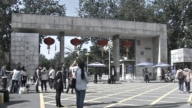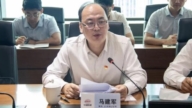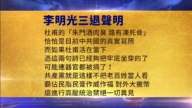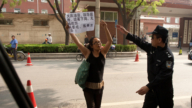【新唐人2015年01月31日讯】《纽约时报》28号报导,根据外国在华科技公司获得的一份文件拷贝,中共当局采纳了一个新规定,要求向中资银行出售电脑设备的公司交出秘密源代码,服从侵入性审计,并且在软硬件上面建立所谓的“后门”以便当局监视。
根据《纽约时报》的引述,针对银行业网络安全的新规定中表示,对于大多数电脑和网络设备,源代码必须交给中共官员。
不过,文章提到,许多外国公司不愿意披露代码,因为担忧知识产权、安全问题,甚至可能触及美国出口法律。
动态网总裁比尔·夏:“软件的话,有些保密措施,就把它锁上,源代码是锁的结构和钥匙。这些技术细节就都泄露出去了,保密的信息中共也都可以看到了。”
新规定还呼吁想向中资银行销售产品的公司,在中国设立研发中心,并建立“端口”,允许中共官员来管理和监督其硬件的数据处理。新规定中说,到2019年,银行和金融机构要确保至少75%的计算机系统,使用“安全和可控制的”技术。
《纽约时报》说,当局在去年年底批准了这份长达22页的新规定,而随着北京声称要进一步加强对关键产业的网络安全管理,在接下来的一个月里,外国科技公司可能还会面临一系列这样的条规政策。
中共伸手要源代码,将西方科技企业置于两难。如果将源代码交给中共当局,除了对核心技术保密的考量,在商业方面,使用同样源代码的程序和软件,也将无法出售给美国或其他国家的银行系统。而如果不交出源代码,将难以进入庞大的中国市场。
尽管多个外国企业团体已经在周三,写信给习近平任组长的“中央网路安全和信息化领导小组”,反对新的规定,抱怨其等同保护主义。不过,在当局的“在核心领域弃用国外科技产品”计划下,这也许只是第一步。
根据《彭博社》去年年底透露,中共计划在2020年之前,让银行、军事机构、国企和核心政府机构,放弃使用国外公司的产品,转而使用中国厂商的技术。去年底已经在吉林省四平市,完成了一轮科技产品国产化测试。在前期测试中,工作人员用“中标麒麟”替代了微软Windows,用“浪潮服务器”替代了IBM服务器。
而对中国国内的民众来说,这可能意味着“外面的网络”更遥远,“家里的网络”更不自由。
纽约哥伦比亚大学访问学者谷川:“它最根本的目的就是为了控制网民、控制言论自由、控制网络自由。但是它附带会产生那些作用,一是贸易保护主义,二是国内那些科技公司的发展,让这些公司占领这些市场。”
纽约哥伦比亚大学访问学者,网络专家谷川举例,就像Google,因为不配合中共的网络审查,撤出了中国,之后中国市场就被百度占领。
而中共在去年11月公布的《反恐怖主义法(草案)》,甚至更进一步,所有在中国境内的电信业务经营者,和互联网服务提供商,将被要求为政府开通“后门”,将密码方案提报主管部门审查,并且将相关设备、境内用户数据留存在中国境内,否则就不得在境内提供服务。
正在大举占领中国智能手机市场的苹果,无疑也将面临这个问题,苹果在iPhone 6使用新的加密方法,是基于每部手机独特代码的复杂运算。苹果说,新机加密系统不设“后门”,所用密码只有用户自己才知道,即使法庭命令交出资料,公司也无能为力。但是中共有关反恐的新法律一旦通过,会要求苹果提供一个钥匙,以便中共可以解密iPhone上面存储的数据。
采访/易如 编辑/尚燕 后制/舒灿
Chinese Regime Asking For Source Code
Dilemma For Western Technology Companies
The New York Times has reported on the 28th that a copy of a
document obtained by foreign technology companies
has shown that the Chinese Communist Party (CCP)
had adopted a new regulation.
It requires companies that sell computer equipment to
Chinese banks to submit secret source code, obey the invasive
audits, build so-called “back doors" into hardware and
software to facilitate authority monitoring.
The New York Times has quoted, the new regulations which are
targeting the safety of the banking network, stated that the
source code of most computer and network equipment
must be handed over to CCP officials.
However, the report mentioned that, due to concerns about
intellectual property rights, security issues and breaching
US export laws, many foreign companies are unwilling to
disclose the code.
CEO of Dynamic Internet Technology, Bill Xia: There are
some security measures in the software to lock it,
the source code is the lock’s structure and key.
If these technical details have leaked out, then CCP can see
the confidential information.
The new regulations also called for companies that want to
sell to Chinese banks to establish research and development
centres in China, and build “ports" allowing CCP officials to
manage and monitor their hardware’s data processing.
The New York Times reported, this 22-pages long new rules and
regulations was approved by the authorities at the end
of last year.
With Beijing claims to further strengthen the management
of network security in key industries, foreign technology
companies may face a series of such regulatory policies
in the coming months.
CCP requirements for submitting source code has put
Western technology companies in a dilemma.
If they hand over the source code to the CCP, in addition to
concerns about core technological secrets, they also cannot
sell programs and software using the same source code
to US or other countries’ banking system.
If they do not hand over the source code, it will be very
difficult for them to enter the huge Chinese market.
Multiple foreign business groups has sent a letter to the
Central Leading Group for Internet Security and Information
led by Xi Jinping, to object to the new regulations and
complain it is equivalent to protectionism.
However, under CCPs plan of “Abandoning foreign technical
products in core areas", may just be the first step.
Bloomberg revealed at the end of last year, CCP plans to
make banks, military institutions, state-owned enterprises
and government agencies to turn away from foreign
company’s products to Chinese products before 2020.
A round of testing domestic technology products has been
completed late last year in Siping City, Jilin Province.
In the early stages of the test, staff members replaced
Microsoft Windows with “Kylin OS", and replaced their
IBM server with “Inspur server".
For Chinese people, this may mean the “external network"
is even more distant, and the “domestic network"
has even less freedom.
Visiting scholar at Columbia University, New York, Tanigawa:
Its fundamental purpose is to control netizens, freedom of
speech, and Internet freedom.
But it has some side effects, one is trade protectionism, the
other is allowing the domestic technology companies to
develop and occupy the market.
Tanigawa, who is also a network specialist, gives the example
of Google, which withdrew from China because it did not
cooperate with the CCPs Internet censorship, and the Chinese
market was then occupied by Baidu.
The draft of the “Anti-Terrorism Act" which was announced by
the CCP in Nov. last year even stated all telecom operators
and Internet service providers in China would be asked to
open back doors for the government.
They must submit their password schemes to the department
for examination, and leave the related equipment and user data
in China, otherwise may not provide services in China.
Apple, which is currently occupying China’s smart phone market
will undoubtedly face this problem.
Apple uses a new encryption method in the iPhone 6, which is
based on complex calculations of each phone’s unique code.
Apple has stated that there is no “back door" in the new
encryption system, only users themselves know their own
password, so even if the court orders Apple to hand over
the information, the company cannot do anything.
However, if the CCPs new anti-terrorism laws are adopted,
it will require Apple to provide a key to the CCP so it
can decrypt the data stored on the iPhone.
Interview/YiRu Edit/ShangYan Post-Production/ShuCan




























